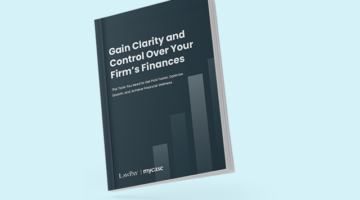 This column has already discussed how people from older generations sometimes don’t understand what it’s like to live with student loans. Indeed, individuals who graduated from law school decades ago usually cannot comprehend how much it currently costs to earn a legal education, and how student debt can have monumental effects on one’s life(Opens in a new window). It can be especially frustrating when bosses are tone-deaf about student loans.
This column has already discussed how people from older generations sometimes don’t understand what it’s like to live with student loans. Indeed, individuals who graduated from law school decades ago usually cannot comprehend how much it currently costs to earn a legal education, and how student debt can have monumental effects on one’s life(Opens in a new window). It can be especially frustrating when bosses are tone-deaf about student loans.
Having student debt creates a number of unique challenges in how we as attorneys execute our jobs. Indeed, student debt influences what jobs individuals can pursue and impacts many other employment decisions novice attorneys make. There are a few things that bosses can keep in mind in order to minimize the burdens that student loans can have on employees.
From my own personal experience, it seems that most bosses don’t realize that people with student loans do not have much money in savings. Student debt borrowers typically do not have too much cash on hand, since large monthly student loan payments suck up money that could be used to build savings. Since student loans usually have insanely high interest rates, it also does not typically make much sense to keep extra money in savings, because any free cash can be used to pay down student debt.(Opens in a new window)

Take Control Of Your Firm’s Finances With Tools Built For Success
Position your firm for long-term growth with better financial visibility and control. Learn how to track performance, manage spending, and plan strategically—download the full e-book now.
Some employers require employees to spend their own money and later be reimbursed for business trips, CLE courses, and other work-related items. Usually this arrangement is agreeable, since this allows employees to earn valuable credit card points. However, the reimbursement process can pose challenges if an employer waits a long time before reimbursing an employee who has student loans. This is because the employee might not have enough cash to pay for the work-related expenses before a credit card payment is required.
During my student debt repayment saga, I had tense moments with my employer because my boss did not reimburse me fast enough for business expenses I was forced to front myself. Indeed, right after beginning my first job after graduating from law school, I was forced to spend thousands of dollars of my own money to attend an expensive retreat, and my employer promised to reimburse me quickly. However, it took a little over a month to be reimbursed, and in the meantime, I had to float the money myself even though I did not have much cash in savings. My boss seemed frustrated when I asked him when I would be reimbursed, and I was too embarrassed to say anything about my financial situation. In the end, employers can be a little more empathetic toward employees with student loans and understand that it is unfair to have these attorneys float expenses for too long before being reimbursed.
Furthermore, I do not think that any of my bosses ever understood how much money the average student debt borrower pays each month to their student loans. Indeed, attorneys might easily spend a few thousand dollars a month on student loan payments(Opens in a new window), and this burden impacts how much free money individuals have to pay for other items in their lives. I have already discussed on this website and my own blog how some employers do not reimburse employees for fees that every lawyer needs to pay like bar dues, CLE costs, and other expenses. When justifying why one of my prior firms did not pay for these costs, a previous boss of mine related that these expenses were minor, and they were a small price to pay in order to remain licensed as an attorney.
However, to me, these expenses were a massive burden. Since student loans already sucked up so much of my financial resources, any additional cost had a huge impact on me. One year, I paid nearly $1,000 out-of-pocket in bar dues and other expenses, and this was about as much money as I was able to save in a few months. All told, employers should consider student loans when determining which expenses to pay for, since any additional cost can be a huge burden to student debt borrowers.

Your Law Firm’s Website Is Failing You.
Here’s What The Best Ones Are Doing Differently.
Furthermore, bosses should also recognize that employees with student debt are a lot more likely to work side-hustles. Many attorneys work side-hustles just to make ends meet, and other lawyers work part-time gigs in order to pay off their student loans early(Opens in a new window). Indeed, I know many lawyers who “moonlight” as bartenders, yoga instructors, and tutors. In fact, some of these individuals work side-hustles so that they have the financial flexibility to work a given “9 to 5” main job.
I never personally had an issue during my student debt repayment saga with a boss due to my side-hustles. This part-time work rarely affected my job as an attorney, and my side-hustles enabled me to work at firms that paid less money. Nevertheless, I have heard of employers taking a dim view of employees working side-hustles. However, employers should understand that our modern work environment is a lot different than it was decades ago. We are all living in the “gig economy,” and bosses should be more cognizant of the side-work employees need to perform in order to make ends meet and pay off student loans.
In the end, it is not easy to be an attorney with student loans. Not only it is difficult to make ends meet financially, but some work obligations can exacerbate a few of the difficulties that student debt borrowers face. However, with some understanding and empathy, bosses can better support employees who have student loans.
 Jordan Rothman is the founder of Student Debt Diaries(Opens in a new window), a personal finance website discussing how he paid off all $197,890.20 of his college and law school student loans over 46 months of his late 20s. You can reach him at [email protected].
Jordan Rothman is the founder of Student Debt Diaries(Opens in a new window), a personal finance website discussing how he paid off all $197,890.20 of his college and law school student loans over 46 months of his late 20s. You can reach him at [email protected].